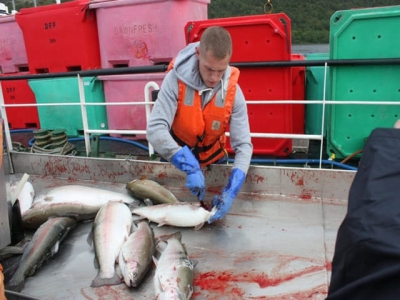A multilingual approach to improving farmed fish welfare

A film aimed at improving the welfare of farmed fish at slaughter has been translated into nine languages.
The trout and salmon sectors stun fish prior to slaughter
According to the Humane Slaughter Association (HSA), which created the film, humans eat more farmed fish than any other type of mammal or bird slaughtered for human consumption. The numbers amount to billions and, world-wide, many of these fish are not humanely stunned before slaughter.
As a result, HSA commissioned the film in a bid to raise welfare standards, to help guide consumers – available at https://hsa.org.uk/publications - which explains why concerns about fish welfare are becoming more prominent, provides information about the welfare of farmed fish at slaughter and explains how consumers can make choices to improve finfish welfare. Originally in English, HSA has now provided translations of the video into Spanish, Greek, Italian, German, French, Polish, Portuguese, Japanese and Korean.
Humane stunning methods have been developed for some commonly farmed species. For other species farmed in large numbers there are, as yet, no validated methods of humane stunning. To address this problem, the HSA has announced, and is currently in the process of evaluating, proposals to fund research which may significantly increase the numbers of farmed finfish that are humanely stunned.
“This research is very important as, without appropriate knowledge, it is not possible to set high standards. However, it will take time to produce results and, in the meantime, using information from the video, consumers can choose to purchase fish which has been reared and slaughtered in more humane ways,” the charity explained.
Có thể bạn quan tâm
 EC to review yellow card on Vietnamese seafood in November
EC to review yellow card on Vietnamese seafood in November Review the country’s efforts to have the restrictive yellow card on its seafood products removed, instead of visiting in June as previously planned.
 Export of aquatic products forecast to grow 8 percent in Q2
Export of aquatic products forecast to grow 8 percent in Q2 Exports of aquatic products in the second quarter could increase by 8 percent at the highest
 Small production 'hindered' Vietnamese shrimp industry
Small production 'hindered' Vietnamese shrimp industry Small production has been the "Achilles heel", making it difficult for Vietnamese shrimp to penetrate deeply into markets.